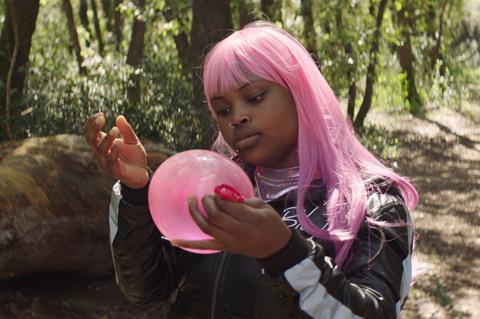Roberto De Paolis’ impressive second feature examines the life of a Nigerian prostitute outside Rome

Dir/scr: Roberto De Paolis. Italy. 2022. 110 mins.
The pine forest on the edge of Rome where Princess works couldn’t be further away from the sacred groves of her native Nigeria. Criss-crossed by roads, sullied by fly-tipping, it’s not so much nature reserve as non-place, neither of the city nor fully free of it. For Princess, it’s a transactional zone where she services male clients, but also, in Roberto De Paolis’ impressive second feature, a kind of limbo — sometimes hostile, sometimes protective — for a young woman who finds herself trapped between cultures, relegated to the margins of a Europe that is more wasteland and waiting room than promised land.
One of the film’s real strengths is the way that it upends lazy audience assumptions
The opening slot of Venice’s parallel Horizons sidebar feels like a consolation prize for a film that would not have looked out of place in Competition. Even without knowing that writer-director De Paolis spent months building the trust of some of the many Nigerian prostitutes who live and work in and around Rome, we sense that this is a story based on a series of lived experiences. Shot with an urgency that mirrors its protagonist’s “always on” setting, this tough low-budget indie should see plenty of further festival action — just like the director’s 2017 debut, Pure Hearts, which chalked up more than thirty festival bookings after its Cannes Quinzaine premiere. But this assured blend of gritty realism and existential mood-painting should also strike a chord with arthouse distributors.
True-life trafficking victim Glory Kevin plays the titular 19-year-old sex worker Princess with a blistering energy that breaks like a wave against the more subdued, actorly performances of a series of Italian professionals — including the versatile Lino Musella, who plays the closest Princess comes to a love interest. One of the pleasures of the film is seeing actor and street-cast first-timer adjusting to each other’s performances as well as each other’s characters.
In her garish pink wig, Princess works on the edge of a pine forest just inland from the Roman seaside resort of Ostia — because, as she points out matter-of-factly at one point, “white girls work in the city, Black girls work in the bush”. If the wood looks familiar to Italian film buffs, it’s because it was a key location in Fellini’s The White Sheik. There it was the Arcadian setting for a doomed romantic fantasy; here, it kind of is too. But it’s also the squalid sylvan workplace where Princess, her older best friend Success (Sandra Osagie) and other Nigerian girls have sex among the trees with male clients who range from sad to abusive — and rarely have the right money.
Some of this feels anecdotal — like the taxi-driver client (played by Neapolitan actor Salvatore Striano) who pays Princess to strip naked and stand in front of his car, then drives off with all her clothes. But even here, the film’s episodic structure gradually peels back to reveal elements that drill down into folk traditions and the supernatural. When Princess and Success are chased by a pair of mounted policemen, she takes refuge in a dense thicket while horse and rider prowl outside. She’s a shape-shifter, using wigs, braids and even tinted contact lenses to change her appearance, as if trying to elude the role she’s been assigned. She has even convinced herself that it’s the body of another woman who has stayed behind in Nigeria that her customers are using and abusing, not her own.
Money — much of it sent back to relatives in Africa — is not just a source of income but a guarantee of distance, a kind of emotional condom. Romance, in Princess’ world, is just another word for freeloading. She’s not wrong: one of the film’s real strengths is the way that it upends lazy audience assumptions, and without remotely sugar-coating Princess (who remains spiky to the end), generates sympathy by taking us into a mindset where sympathy is a luxury. It’s also a film that has a great sense of rhythm, a fine feel for colour (Princess is a Day-Glo shout of defiance against the murky forest background), and a tasty soundtrack that mixes techno, mood music and Nigerian hip-hop.
Production companies: Young Films, Indigo Film, Rai Cinema
International sales: True Colours, sales@truecolours.it
Producers: Carla Altieri, Roberto De Paolis
Production design: Paola Peraro
Editing: Paola Freddi
Cinematography: Claudio Cofrancesco
Music: Emanuele de Raymondi
Cast: Glory Kevin, Lino Musella, Sandra Osagie, Salvatore Striano, Maurizio Lombardi















![[L-R]: Amanda Villavieja, Laia Casanovas, Yasmina Praderas](https://d1nslcd7m2225b.cloudfront.net/Pictures/274x183/6/4/1/1471641_pxl_20251224_103354743_618426_crop.jpg)








